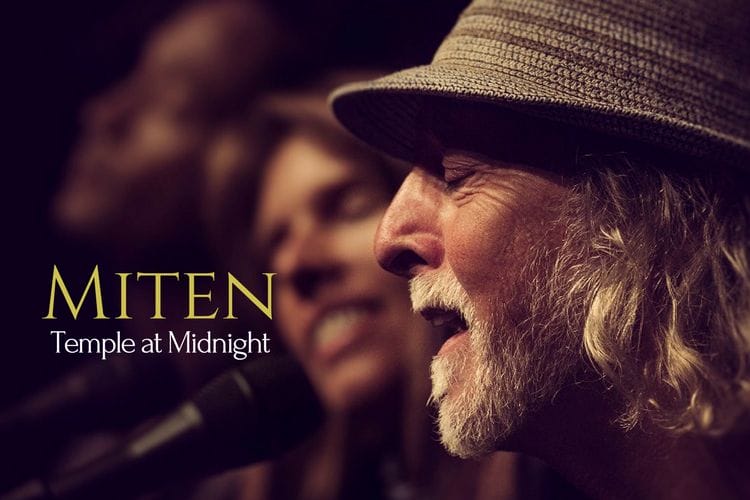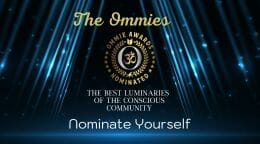Miten: Temple at Midnight

An Interview with Miten: Temple at Midnight
Miten grew up in the 60’s. “At that time, England was alive with rock ‘n’ roll music and the sound of The Beatles. Everywhere you went, it was on the street. It was a time of innocence, a time when you could sense the possibility that life has no boundaries.”
He later went on to establish a successful career for himself in the 70’s, and 80’s as a singer/songwriter, touring with such bands as Fleetwood Mac, Lou Reed, and Ry Cooder. During this time he released two well-received albums, one produced by The Kinks, another by noted Los Angeles producer Bones Howe for Ariola Records. Ultimately he found the rock ‘n’ roll lifestyle unfulfilling and empty, and he began an inner search which led him into the world of meditation. It was at this time he came upon the most important and influential figure in his life, the rebel mystic, Osho. “After I had met Osho, everything fell into place,” he says. “He gave purpose to my life and an understanding that divine chaos is the essence of it. My eyes were opened to new possibilities which I continue to explore to this day.” Miten proceeded to live his explorations, spending most of his time in India at the ashram of Osho, where he eventually found a way to express his gratitude, not surprisingly, through music.
Miten has incorporated elements of Sufi dance, natural rhythms, and ambient grooves into his music, which combined with Premal’s mantras and chants form a rich, unforgettable tapestry of sound.
Miten now tours the world with his musical and life partner, Deva Premal, whom he met in India at Osho’s ashram in 1990. The couple, known as Deva Premal & Miten, are well known in the world of alternative spirituality and yoga for their chanting of Indian Sanskrit mantras and Desmond’s spiritually inspired songs. Yoga International featured the duo in a 2009 article on Yoga Rock Stars: “They are the Johnny and June Carter Cash of sacred music, with more than a dozen albums and a fan base that includes both Cher and the Dalai Lama.”They have collaborated with motivational speaker Anthony Robbins, in excess of best-selling author Eckhart Tolle, and rock icon Cher, who covered their version of the ancient prayer The Gayatri Mantra on her Farewell Tour in 2002.
Deva & Miten’s record company, Prabhu Music, report more than one million, and the couple travel the world continually with Nepalese bansuri maestro Manose, playing up to 25 countries in the space of a year.
SANDRA SEDGBEER: Your new album, Temple at Midnight, is described on your website as a soulful, all-acoustic tale of love and redemption. What was the inspiration for the album and title?
MITEN: The inspiration for making music is to share something that cannot be put into our normal way of expressing ourselves through words. Music, for me, unwraps us. It cuts through a lot of bullshit and goes right through to the soul. That’s the place Deva and I actually make the music, and that’s where we live and hang out in this space of a dimension where we hear music and play music from a place of meditation and stillness. So, that was basically my inspiration for Temple at Midnight.
As for the songs, I am 69 years old. I grew up in the 60’s and was influenced by the folk music back then, and by the great music that was being played. My journey through life took me to India and to the Puna Ashram in India, and I stopped playing music. I wanted to heal from this kind of cross I was carrying of being a rock musician and playing music for money. I did not understand what real music was until I started to meditate, and that is where the music comes from. So, Temple at Midnight, being with Deva and me and our friends, playing together and singing together in this sacred temple, it felt like a good environment to invite people to come into.
SANDRA SEDGBEER: You toured in the 1970’s with bands such as Fleetwood Mac, Lou Reed, The Velvet Underground, Randy Newman, Hall & Oates, and you gave it all up after reading a book by Osho. It must have come as a bit of a culture shock being a North London boy in India. Was that a difficult process for you in the beginning?
MITEN: It was magical. It was everything extreme and intense you could imagine. Back then, when you first arrived at Bombay airport, as it was then known, you were transported into a different world. You were just not ready for that kind of culture shock because you saw so many sad things, like the kids and the begging, people living on the streets. So, yes, it was a big shock, and that was not a bad thing for me. It helped to dissolve some of those old Western attitudes I had been conditioned to carry all my life. Plus, India is Mother India – there is something so beautiful and benevolent about the soil, about being in Mother India, and that was an incredibly healing for me, too.
Then, being in the Ashram, learning meditation, and being able to contribute in some way by working in the kitchen. I did not want to play music. The meditations took me into a new understanding, a new perspective on life. So, it was a big change. The teachings were very radical. It was not a traditional Ashram and the only reason I went there was because I read “No Water, No Moon,” a book of transcriptions of Osho’s discussions on various Zen parables. It was so filled with intelligence, insight and enlightened expression that I just could not believe it. It resonated with me at a time when I was in a very delicate and fragile place in my life. I had left my family, and my so-called career as a rock musician was beginning to make no sense at all. I needed to find something and some sustenance. I had never expected myself to go in that direction until I read that book. I just left; my family, my Manager, and my record company, publisher, the band, and everything. I just walked out, and I never went back.
SANDRA SEDGBEER: You also left behind your name.
MITEN: Yes, I left behind my name. That was another confirmation to me because Osho gave me the name Prabhu Miten. Prabhu means “God” – it is a very sweet way to talk of the divine, like “My Sweet Lord.” Miten means “friend.” He did not know that I did not have a friend in the world at that time, and he gave me the name “Friend of God.” Be a friend to yourself first, you know, and that was a great, great gift.
SANDRA SEDGBEER: Great lesson – be a friend to yourself first. It was also Osho who got you playing music again.
MITEN: Yes. I needed time to heal. I had come with all these concepts that I did not want to carry anymore, and the last thing I wanted was to be involved in music. Osho’s Ashram was a huge tantric experiment, so we were not strangers to sexual energy and that first chakra and the second chakra. We were learning how to move that energy up into higher chakras and into higher realms, and that was the whole point of those days of not denying sexuality, but actually embracing it. So, I was aware of all this, and I just dissolved into the whole Sangha family, spiritual family, and when I felt dissolved it was not a decision, intellectually, I just one day picked up a guitar and started to say something in a song that was saying thank you to my Guruji. That was all I really wanted to do, I just wanted to say thank you for rescuing me. So, that is where the songs began to come from, and they just continued. I do not want to stop them. I do not chase them anymore like I used to when I was doing it for a living. It is just not about money, it is not about ambition or entertaining anybody. That is not what Deva and I are interested in.
SANDRA SEDGBEER: Osho’s Ashram at Puna is where you met your musical partner and love, Deva. Tell us a little bit about that.
MITEN: Deva is the love of my life. We met when she was a 20-year-old girl. I was already old, 43, and she was in the Ashram studying bodywork. I was responsible for the music in the evening meditations where we would all come together wearing white, and Osho would come and sit with us, and we would play music. Deva was not really a singer, but when we sat together, and I played guitar she would join in sometimes. She was very shy, but she could play keyboard, piano, and stuff. She used to sing sometimes with me, so I slowly brought her into the ensemble. Then we started to play together and it all just unfolded over the following years. We met in a place of innocence, really, in the Ashram and that is how we hang out with each other. We just celebrated our 26th year together, and we are basically together 24/7.
A veteran broadcaster, author, and media consultant, Sandie Sedgbeer brings her incisive interviewing style to a brand new series of radio programs, What Is Going OM on OMTimes Radio, showcasing the world’s leading thinkers, scientists, authors, educators and parenting experts whose ideas are at the cutting edge. A professional journalist who cut her teeth in the ultra-competitive world of British newspapers and magazines, Sandie has interviewed a wide range of personalities from authors, scientists, celebrities, spiritual teachers, and politicians.









